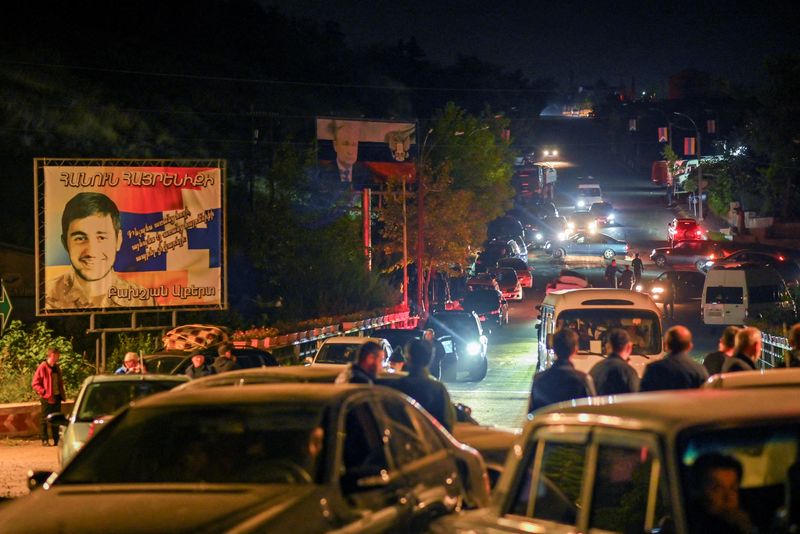By Anthony Deutsch and Stephanie van den Berg
THE HAGUE (Reuters) - As tens of thousands of ethnic Armenians flee their homes in Nagorno-Karabakh, several international experts say the exodus meets the conditions for the war crime of "deportation or forcible transfer", or even a crime against humanity.
Nagorno-Karabakh is internationally recognised as part of Azerbaijan but populated mainly by Armenian Christians who set up the self-styled Republic of Artsakh three decades ago after a bloody ethnic conflict as the Soviet Union collapsed.
By Friday, over 90,000 of the estimated population of 120,000 had fled into Armenia, the RIA news agency cited the Yerevan government as saying.
The exodus has evoked the spectre of the 1988-94 war between Armenians and their Azeri neighbours, part of a history of ethnic bloodshed and displacement going back generations that scars the region's folk memory and has bred deep mutual fear and suspicion.
Hikmet Hajiyev, foreign policy adviser to Azerbaijani President Ilham Aliyev, told journalists in Brussels on Tuesday: "Sometimes in international press ... we find certain metaphors that ethnic cleansing is taking place or Azerbaijan is conducting genocide ...
"There was no verified fact on the ground of any kind of violence against the local civilians."
Whatever the history and the lack of independent reports on events inside the isolated territory, several international legal experts believe the mass flight fits the legal definition of a war crime.
The ICC's founding documents say that, when referring to forcible transfer or deportation, "the term 'forcibly' is not restricted to physical force, but may include threat of force or coercion, such as that caused by fear of violence, duress, detention, psychological oppression or abuse of power against such person or persons or another person, or by taking advantage of a coercive environment".
Such a "coercive environment" was created in Nagorno-Karabakh before the offensive by Azerbaijan's obstruction of essential supplies, said international lawyer Priya Pillai and Melanie O'Brien, visiting professor at the University of Minnesota and president of the International Association of Genocide Scholars.
POSSIBLE CRIME AGAINST HUMANITY
Big gains in a 44-day war in 2020 had put Azerbaijan in a position to block the flow of food, fuel and medicines from Armenia along the Lachin corridor - for three decades Karabakh's lifeline through hostile territory.
"So the fear/apprehension of the population – due to the coercive environment created by the months-long blockade and the recent armed attack – would meet the threshold for this crime," Pillai said, adding that it would be a more severe 'crime against humanity' if considered to be part of a widespread attack.
There is, however, no swift path to prosecution because neither state belongs to the International Criminal Court (ICC), the permanent tribunal for war crimes, crimes against humanity and genocide.
O'Brien believes the blockade - which Baku said was needed to prevent weapons smuggling - was in effect the start of a genocide because it was implemented with the aim of "deliberately inflicting conditions of life designed to bring about the physical destruction of the targeted group".
The first prosecutor of the ICC, Luis Moreno Ocampo, agreed with O'Brien's argumentation, noting that a ruling of genocide did not require mass killings.
"For me, it's obviously a genocide," he said.
For Azerbaijan, however, retaking control of Nagorno-Karabakh helps to redress the traumas of 1988-94.
Around 30,000 people were killed in fighting to establish separate homelands, according to "Black Garden: Armenia and Azerbaijan Through Peace and War", a 2003 book by Thomas de Waal.
At the same time, some 500,000 Azeris from Karabakh and the areas around it were expelled from their homes while 350,000 Armenians left Azerbaijan and 186,000 Azerbaijanis left Armenia.
The Lemkin Institute for Genocide Prevention, a legal think-tank, warned in a 127-page report on Sept. 5, days before Azerbaijan's offensive, of the dire potential consequences.

"It would almost assuredly result in the forced displacement of Armenians from Artsakh (Nagorno-Karabakh) and the widespread commission of genocidal atrocities, reflecting those committed in the Second Nagorno-Karabakh War of 2020 and subsequent hostilities," it said.
"If the Armenians of Artsakh were to be displaced ... it would result in the genocidal destruction of a people, as the Artsakh Armenians would lose their distinct identity."